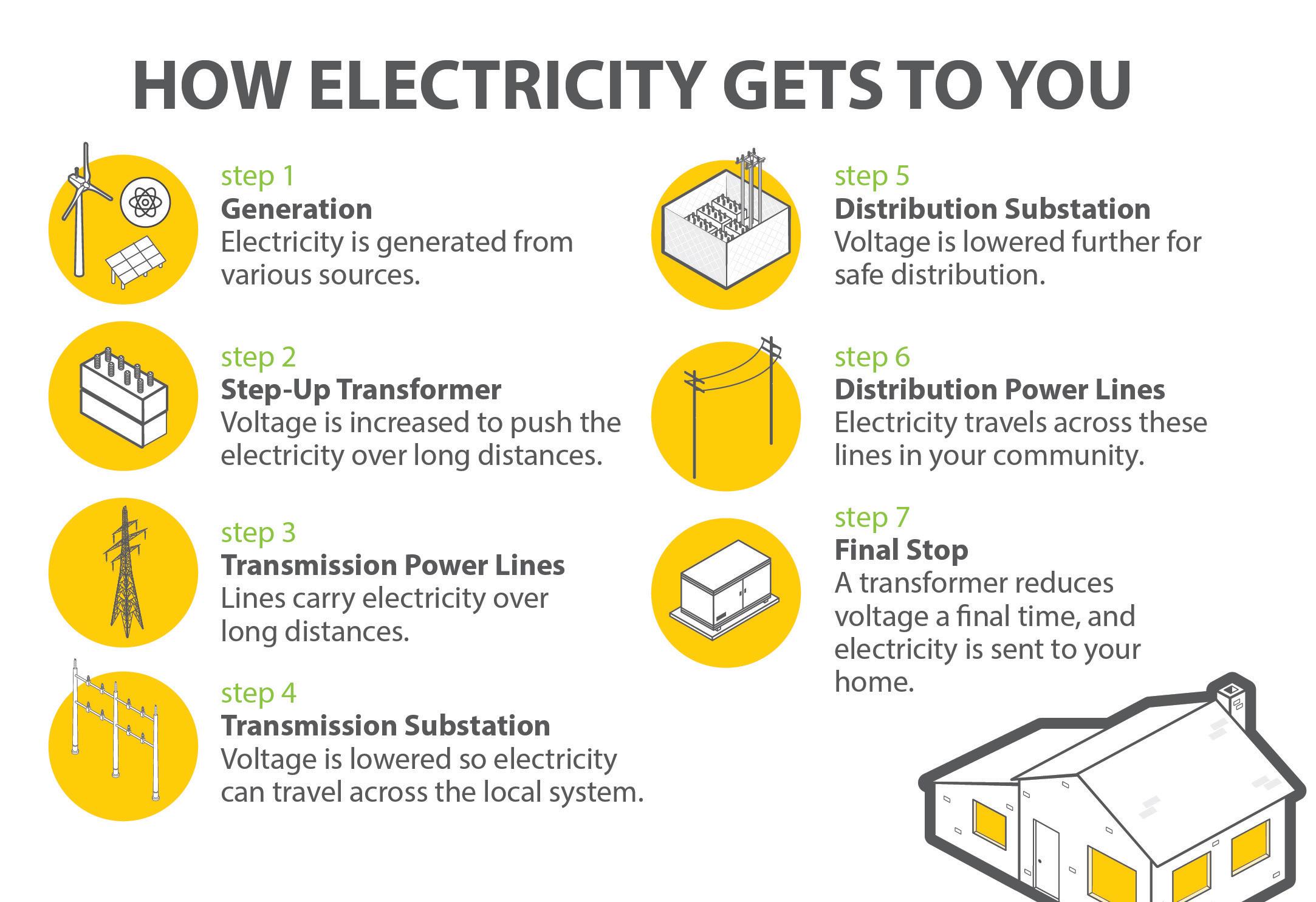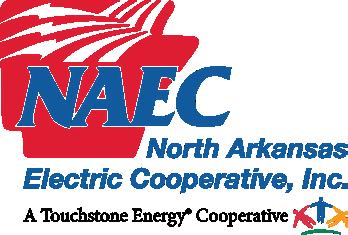
MEL COLEMAN CEO


MEL COLEMAN CEO
When you flip a switch and the lights come on, it seems simple enough. But the journey electricity takes from generation facilities to the meter at your home is anything but simple. It’s a complex process that relies on proper engineering, safety systems and yes — your help — to keep it safe and reliable.
Electricity begins its journey at a power generation facility, often miles away. From there, it travels across high-voltage transmission lines to substations where the voltage is reduced for distribution. Finally, it makes its way through lower-voltage distribution lines that feed into neighborhoods and homes. Along the way, the process is monitored and managed to maintain stable voltage ranges and address potential issues.
As with any complicated process, things can go wrong. Some issues can be controlled, but some can’t. Lightning strikes, tree limbs, animal interference or equipment failures can cause momentary voltage fluctuations or outages. Our substations and distribution lines are protected with breakers, fuses and voltage regulators to minimize those effects. However, once power reaches your home, you play a key role in protection.
One of the most overlooked elements of home electrical safety is proper grounding. Grounding ensures that in the event of a surge or fault, electricity has a safe path to follow to ground. Without it, energy can take unexpected paths — damaging appliances or even endangering your family. Every home’s electrical system should be grounded according to code, and a licensed electrician should periodically verify that the grounding is intact and effective.
Voltage delivered

to homes is kept within a standard operating range, but sensitive electronics and appliances can still be affected by fluctuations, especially during storms. That’s why surge protection — both at the device level and at your main panel — is highly recommended. It’s an investment that protects other investments, like your HVAC system, refrigerator or home office equipment.
Every day, we invest in keeping our system safe, smart and secure. But the electrical system is a partnership — from generation sources to your meter. We encourage you to take simple steps:
1. Inspect your grounding;
2. Consider surge protection; and
3. Contact North Arkansas Electric at (870) 895-3221 if you notice flickering lights or other irregularities.
Electricity is a modern miracle, that requires maintenance and respect. Working together, we can keep it flowing safely and reliably to power your lives.


program awards thousands of dollars in scholarships to local graduating high school seniors each year. In 2024, 15 students were awarded $1,000 scholarships, and three students were
NAEC is accepting applications for the 2025-2026 scholarship program. The application is
include a transcript and two letters of recommendation — with at least one from a nonschool
To be eligible for the scholarship, high school seniors must graduate at the end of the 2025 school year, and their parents or legal guardians must be NAEC members. Applicants also must have a grade-point average of 3.0 or higher on a 4.0 scale through the first semester of senior year. The scholarship must be used to attend an accredited institute of higher learning on a full-time basis. For more information, please contact Tori Moss, NAEC marketing and communications director, at (870) 895-6210 or tmoss@naeci.com.

225 S. Main St., Salem
North Arkansas Electric Cooperative Vice President of Member Services Leah Rouse presents Evening Shade Fire Department Assistant Chief Steve Burkhart with a $1,000 donation from Operation Round Up® to help buy thermal imaging cameras. Other fire department personnel present included, from left: Lt. Darrell Massey, Allan Jenkins, Susan Arnold and Travis Bonisa. Members who would like to “round up” their electric bills to support scholarships and nonprofit donations can call (870) 895-3221. The donation averages $6 per account annually.
Members can help fund future scholarships by enrolling their accounts in Operation Round Up. Volunteers allow their electric bills to be "rounded up" to the next dollar each month. Call (870) 895-3221 to join today!

home is going to be part of a planned outage
OUTAGE (870) 895-3221 (844) 335-4461
NAEC App naeci.com ▶ Outage Viewer
NAEC App naeci.com ▶ Outage Viewer
FOLLOW NAEC Twitter.com/NorthARElectric Facebook.com/NorthARElectric
To enroll your account(s) in auto bank draft, call (870) 895-3221 or visit an NAEC office during regular business hours.
NAEC’s Tyler Ochoa, left, and Chris Hickman demonstrate wind generation for Izard County Consolidated academic summer camp attendees. They shared the pros and cons of intermittently available generation sources, such as wind and solar, and how we need a mix of generation sources anchored by baseload sources, such as coal and natural gas, to ensure electricity reliability and affordability.
two of the many reasons why NAEC might need to contact you. It's important to keep a current mailing address and at least one phone number and email on file. To update or check your contact information, call (870) 895-3221, visit an NAEC office or submit a form available at naeci.com/contact-naec.
FOLLOW NAEC Twitter.com/NorthARElectric Facebook.com/NorthARElectric NAEC's offices will be closed Sept. 1 in observance of Labor Day. A dispatcher will be on duty, and personnel will be on call in the event of an outage. Report an outage to the NAEC app or (870) 895-3221.
High school juniors have until March 5 to submit an application for Youth Tour, an all-expenses-paid trip to Washington, D.C., and Philadelphia June 14-20. Download the application at naeci.com.

BY MITCH ROSS
A friend asked me to help diagnose his home’s recurring high electric bills. After an audit, we found things that could have been a bit better, but nothing that quite explained his problem. It wasn’t until we started talking about how his family uses hot water that the culprit became apparent.
His family was accustomed to taking baths only, preferring them over showers. On top of that, they often enjoyed soaking in the tub long enough to require filling it with additional hot water. I began doing the math.
Their bathing habits alone were adding about $175 per month to their electric bill. By switching to a more economical option — using a 1.5 gallons-per-minute (GPM) shower head and taking 10-minute showers on average — his family would only spend about $50 per month, saving $125 per month or $1,500 per year!
For the typical household, hot water is the second highest category of energy expense. Luckily, there are several cheap and easy ways to lower this portion of your energy bill.
• Take short showers instead of long showers or baths.
• Use 1.5 GPM shower heads.
• Use .5 or 1 GPM faucet aerators for sinks.
• Use cold water to wash clothes. Modern detergents don’t require hot water to get most clothes clean.
• Lower the temperature setting on your water heater. Around 120 degrees is recommended, but try to find the lowest temperature setting that works for your home.

• Install pipe wrap on both pipes coming out of the top of the water heater and all the hot water lines.
• Don’t prerinse dishes with hot water before placing them in the dishwasher.
• Don’t use a circulation pump. If you feel you must, have it on a timer running as little as possible.
• Consider installing a heat pump water heater. Heat pump water heaters are the most cost-effective way to heat water. They can potentially save $400 or more per year.
By implementing all these changes in my own home (including a heat pump water heater), my family spends less than $80 per year to heat water for our home, as verified by a metering device I have installed on my water heater.
My friend has since implemented several changes to how they use hot water, and he has seen his bills go down. He is planning on installing a heat pump water heater later this year, leading to even greater savings for his family.
Mitch Ross is the energy efficiency manager for the Electric Cooperatives of Arkansas.